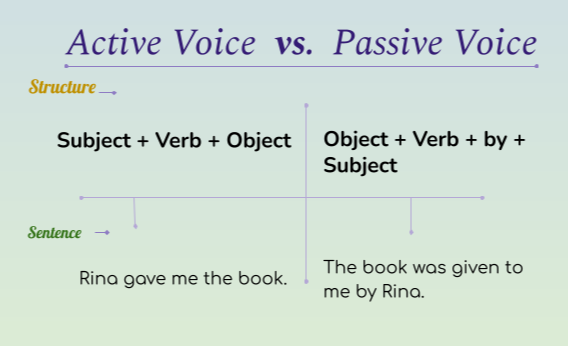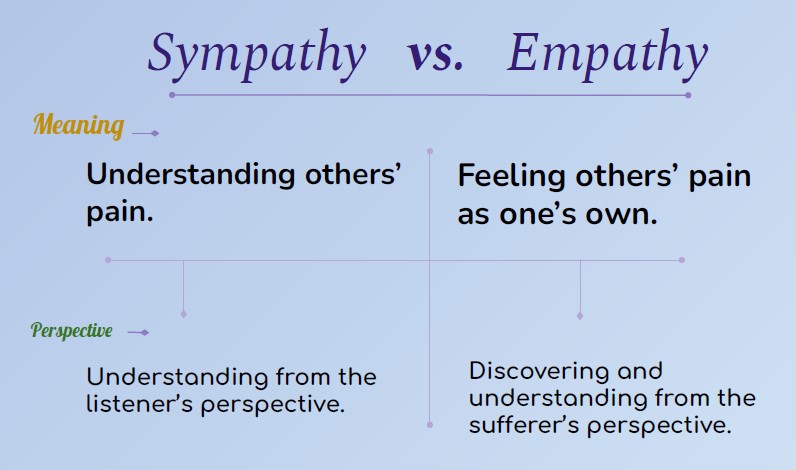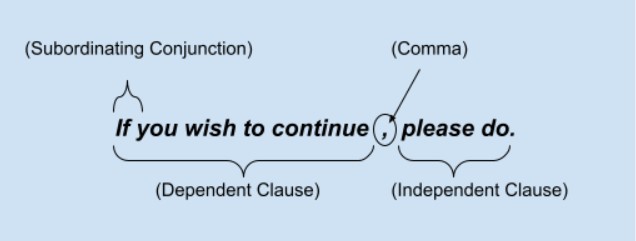Complex vs Compound Sentences
Complex and Compound sentences can be very confusing mainly because of their names. “Complex” and “Compound” are synonymous terms in general. There are subtle differences between these two types of sentences. Knowing about their method of formulation would help ease the process of differentiating between them.
The Definitions
A Complex Sentence has one Independent and at least one Dependent Clause connected by one Subordinating Conjunction where a Compound Sentence has two Independent Clauses connected by one Coordinating Conjunction.
Independent vs Dependent Clause
Independent Clauses can stand alone as complete sentences without any external help and there is no scope open for more information. The Dependent Clauses are incomplete Simple Sentences even though they have their own subjects and verbs since there is more left to be said. Dependent Clauses are not complete unless they are attached to Independent Clauses.
Coordinating vs Subordinating Conjunction
Coordinating Conjunctions combine two Independent Clauses of similar grammatical importance that are also parallel in meaning and not contrasting. There are seven Coordinating Conjunctions in the English language and the learners can take the help of mnemonic FANBOYS (consisting of the initials of all seven Coordinating Conjunctions) - For - And - Nor - But - Or - Yet - So.
Subordinating Conjunctions help join at least one Dependent and one Independent Clause and make complete sense since Dependent Clauses (which they are naturally attached to) cannot do that job on their own. There are over 50 Subordinating Conjunctions in English for being used in different contexts like - because, since, in case, though, lest etc.
Examples: Complex vs Compound Sentence
Complex Sentence:
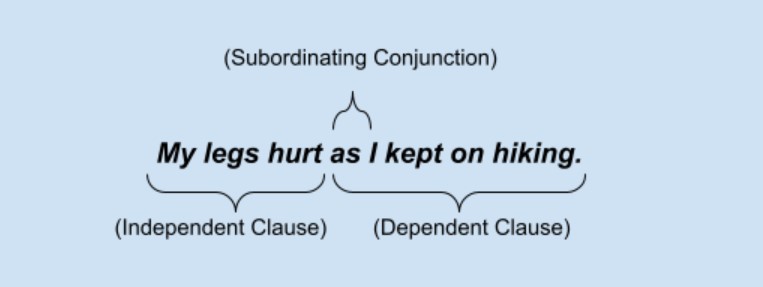
Here, the Subordinating Conjunction “As” joins Independent Clause, “My legs hurt” and Dependent Clause, “As I kept on hiking”.
More Examples:
- I stared out of the window while I reminisced.
- Supposing you are wrong, always have a backup plan.
- Even though it was too hot to go out, we left for a long drive.
Compound Sentence:
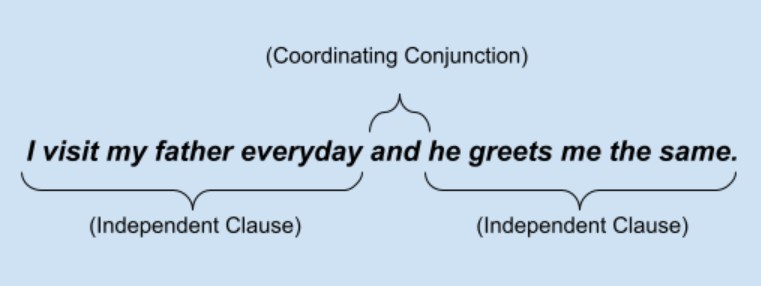
Here, the Coordinating Conjunction “And” links two Independent Clauses, “I visit my father every day” and “He greets me the same”.
More Examples:
- I was sitting beside you but I was somewhere else.
- Kara’s advice was illogical, yet I considered following it.
- I haven’t been to Disneyland nor am I interested.
Where’s the Confusion?
Identifying the Dependent Clause
It becomes rather confusing at times to tell the Dependent and Independent Clauses apart. A way to figure them out can be articulating them out loud and listening to them and trying to see which of them convey a complete sense and which leave more to be added.
We often try to keep the conjunction on the side and try figuring out if the clauses depend on each other. That can be the root of all confusion. The right way is to figure out which clause is the Subordinating Conjunction attached to and that one would be the Dependent Clause.
For example - if you look at the sentence “My legs hurt as I keep on hiking” and try seeing whether “My legs hurt” or “I kept on hiking” would only confuse you since they are linked by the conjunction “As,” you will only confuse yourself. “As I kept on hiking” is the Dependent Clause here with the Conjunction “As” already attached to it which helps link it to the Independent Clause, “My legs hurt”.
Recognizing the Conjunctions
Having a good idea about the types of conjunctions in the English Language can resolve the issue here pretty easily. If you can tell the Subordinating and Coordinating Conjunctions apart, you are good to go.
Subordinating Conjunctions help formulate Complex Sentences and Coordinating Conjunctions sit at the center of Compound Sentences. Knowing which conjunction is of which type can help identify the type of the corresponding sentence in no time at all.
| Elements | Complex Sentence | Compound Sentence |
| Clause | Independent & Dependent |
Independent |
| Conjunction | Subordinating | Coordinating |
With a detailed knowledge of what to look for and how to evidently separate Complex and Compound Sentences, it becomes very easy. Having these tips and tricks up your sleeves, nobody can stop you from identifying these two types of sentences correctly every time.
Grammar
Read More
- How to Use "Therefore" in Sentences Avoiding Common Mistakes
- How to Use "Whereas" with Examples and Avoid Common Mistakes
- When and How to Use "Thus" Correctly Without Common Mistakes
- How to Use "On the Contrary" Properly with Meaning and Examples
- When and How to Use "Either/Or" with Examples and Common Mistakes to Avoid
- How to Use "On the Other Hand" Effectively without Mistakes
- How to Use "Respectively" with Example and Common Errors to Avoid
- How and When to Use "Moreover" Without Mistakes
- How to Use "Likewise" in Sentences Based on Context & When not to Use
- When & How to Use "Although" in Sentences to Avoid Mistake

